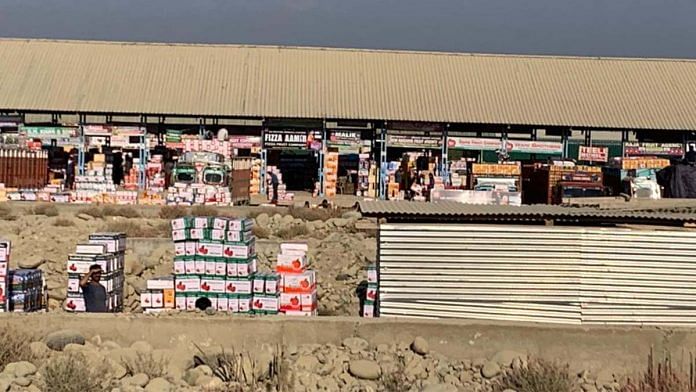
Shopian: The Covid-19 lockdown had an unexpected adverse effect on the apple growing industry in Kashmir. Due to fewer quality checks, fake and spurious pesticides flooded the market and most of the produce this year, as a result, has been labelled as ‘Category B’ quality because of stains.
According to Ashraf Wani, president of the main fruit mandi in Shopian district of South Kashmir, the area produces about 3.5 lakh metric tonnes of fruits, mostly apples, every year. Around 80 per cent of the produce is usually categorised as ‘Category A’ quality.
“Last year we suffered a lot of loss due to the lockdown after 5 August (revocation of Article 370). This year we were expecting our business to grow back to normal but pesticide traders flooded the market with fake stuff during the Corona lockdown. The result is that our produce has been spoiled,” Wani told ThePrint.
He added: “The producers used fake pesticides, which meant that apples had stains on them and many of them also had fungus. This is why 70-80 per cent of our produce has now been labeled as Category B.”
Also read: Fungal scab disease returns to Himachal after 4 decades to hit apple crop and prices
Traders sold fake pesticides to make quick profit
The government’s marketing inspector Riyaz Ahmed agreed that a lot of fake pesticides had been sold in the market and this was the primary cause of the degradation in quality.
Ahmed said apples earlier used to sell for Rs 1,300-1,5000 per 10 kg in the mandi but this time the price had come down to just Rs 800-Rs 1,000 per 10 kg.
He added that there were fewer quality checks because of the lockdown, and traders took advantage of it by selling fake pesticides to make quick profit.
“The problem is that the effects of the fake pesticide will stay on for some time. This will also have an effect on the next set of crops,” Wani said.
Ahmed said the problem was not just limited to South Kashmir but also faced in North Kashmir, which produced higher quantities of apples than his region.
Wani noted there was only one laboratory to check the quality of pesticides in Kashmir and the farmers have been demanding at least two more — one each for South and North Kashmir.
“The test results come after six months of collecting the sample. This delay makes no sense because by the time the results come, the pesticides have already been used,” he said.
Also read: Lower production and Covid scare could drive Himachal apple price up to Rs 400/kg this year

The rate above mentioned in this article is totally wrong and fake
The rate above told is also fake..
We sell approximately 18 kg of A claas apples @550-650 in shopian